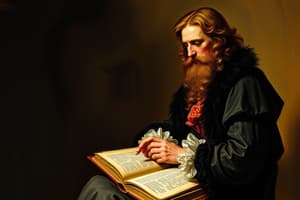Podcast
Questions and Answers
John Donne is often considered the greatest ______ poet in the English language.
John Donne is often considered the greatest ______ poet in the English language.
love
George Herbert gave up his secular ambitions when he took holy orders in the church of ______.
George Herbert gave up his secular ambitions when he took holy orders in the church of ______.
England
Metaphysical poetry talks about deep things like love, soul, religion, and ______.
Metaphysical poetry talks about deep things like love, soul, religion, and ______.
death
A conceit is a comparison of two dissimilar things, which may have very little in ______.
A conceit is a comparison of two dissimilar things, which may have very little in ______.
Platonic love in metaphysical poetry means spiritual love, which is free from elements of ______ love.
Platonic love in metaphysical poetry means spiritual love, which is free from elements of ______ love.
Metaphysical Literary movements are spans of time in which literature shared intellectual, linguistic, religious, and artistic influences. They are the evolution of literature through time. One type of movement during the seventeenth century was the ______.
Metaphysical Literary movements are spans of time in which literature shared intellectual, linguistic, religious, and artistic influences. They are the evolution of literature through time. One type of movement during the seventeenth century was the ______.
The word ‘Metaphysical Poetry’ is a philosophical concept used in literature where poets portray the things or ideas that are beyond the depiction of physical existence. Etymologically, there is a combination of two words ‘meta’ and ‘physical’ in the word “metaphysical”. The first word “Meta” means ______.
The word ‘Metaphysical Poetry’ is a philosophical concept used in literature where poets portray the things or ideas that are beyond the depiction of physical existence. Etymologically, there is a combination of two words ‘meta’ and ‘physical’ in the word “metaphysical”. The first word “Meta” means ______.
Metaphysical poetry is a genre of poetry that deals with deep and profound subjects like love, spirituality, religion, etc. It is a highly intellectual form of poetry that presents the world to its readers in a different way. It asks questions that ______ cannot answer.
Metaphysical poetry is a genre of poetry that deals with deep and profound subjects like love, spirituality, religion, etc. It is a highly intellectual form of poetry that presents the world to its readers in a different way. It asks questions that ______ cannot answer.
Metaphysical poetry prompts the readers to question their reality and existence. It takes readers beyond the physical world and gives new perspectives through its imagery, wit, and ______.
Metaphysical poetry prompts the readers to question their reality and existence. It takes readers beyond the physical world and gives new perspectives through its imagery, wit, and ______.
Metaphysical poetry was at its peak during the seventeenth century in England and continental Europe. The movement explored everything from irony to philosophy and ______.
Metaphysical poetry was at its peak during the seventeenth century in England and continental Europe. The movement explored everything from irony to philosophy and ______.
Metaphysical poetry is a genre of poetry that deals with deep and profound subjects like love, spirituality, religion, etc. It is a highly intellectual form of poetry that presents the world to its readers in a different way. It asks questions that ______ cannot answer.
Metaphysical poetry is a genre of poetry that deals with deep and profound subjects like love, spirituality, religion, etc. It is a highly intellectual form of poetry that presents the world to its readers in a different way. It asks questions that ______ cannot answer.
Metaphysical poetry prompts the readers to question their reality and existence. It takes readers beyond the physical world and gives new perspectives through its imagery, wit, and ______.
Metaphysical poetry prompts the readers to question their reality and existence. It takes readers beyond the physical world and gives new perspectives through its imagery, wit, and ______.
One type of movement during the seventeenth century was the ______.
One type of movement during the seventeenth century was the ______.
The movement explored everything from irony to philosophy and ______.
The movement explored everything from irony to philosophy and ______.
George Herbert gave up his secular ambitions when he took holy orders in the church of ______.
George Herbert gave up his secular ambitions when he took holy orders in the church of ______.
John Donne is often considered the greatest love poet in the English language and is also noted for his religious verse and treatises and for his sermons, which rank among the best of the 17th century. Notable works include The flea, Death, be not proud, Batter My heart, and Pseudo-Marty. Donne was the dean of St. Paul’s Cathedral in ______.
John Donne is often considered the greatest love poet in the English language and is also noted for his religious verse and treatises and for his sermons, which rank among the best of the 17th century. Notable works include The flea, Death, be not proud, Batter My heart, and Pseudo-Marty. Donne was the dean of St. Paul’s Cathedral in ______.
Henry Vaughan, an Anglo-Welsh poet and mystic, was remarkable for the range and intensity of his spiritual intuitions. One of his notable works is Christ’s Nativity. Vaughan is associated with the metaphysical movement and lived during the ______ century.
Henry Vaughan, an Anglo-Welsh poet and mystic, was remarkable for the range and intensity of his spiritual intuitions. One of his notable works is Christ’s Nativity. Vaughan is associated with the metaphysical movement and lived during the ______ century.
George Herbert, a Welsh poet, orator, and priest, is often associated with the metaphysical movement. He gave up his secular ambitions when he took holy orders in the church of ______.
George Herbert, a Welsh poet, orator, and priest, is often associated with the metaphysical movement. He gave up his secular ambitions when he took holy orders in the church of ______.
Metaphysical poetry is known for talking about deep things such as love, soul, religion, and death. It is characterized by 'undissociated sensibility', which is the combination of feeling and ______.
Metaphysical poetry is known for talking about deep things such as love, soul, religion, and death. It is characterized by 'undissociated sensibility', which is the combination of feeling and ______.
A significant feature of metaphysical poetry is the use of metaphysical conceits, which are comparisons of two dissimilar things that may have very little in common. This unique quality of metaphysical poetry is termed as metaphysical ______.
A significant feature of metaphysical poetry is the use of metaphysical conceits, which are comparisons of two dissimilar things that may have very little in common. This unique quality of metaphysical poetry is termed as metaphysical ______.
Flashcards
Who is considered the greatest love poet in the English language?
Who is considered the greatest love poet in the English language?
John Donne, a renowned English poet, is widely considered the greatest love poet in the English language. He is also celebrated for his religious poems, treatises, and sermons, which are considered among the most exceptional of the 17th century. His notable works include 'The Flea,' 'Death, Be Not Proud,' 'Batter My Heart,' and 'Pseudo-Marty.' Donne held the prestigious position of Dean of St. Paul's Cathedral in London.
What is metaphysical poetry?
What is metaphysical poetry?
A type of poetry that explores profound subjects like love, spirituality, and death, it is a highly intellectual style that presents the world in a unique way. It challenges readers to question their reality and existence, offering new perspectives through vivid imagery, wit, and paradox. It poses questions that science cannot answer.
What is a metaphysical conceit?
What is a metaphysical conceit?
Metaphysical poetry is known for its use of 'conceits,' which are comparisons between two vastly different things, often with little in common. These comparisons help create a unique and thought-provoking style.
When was metaphysical poetry at its peak?
When was metaphysical poetry at its peak?
Signup and view all the flashcards
Who is George Herbert?
Who is George Herbert?
Signup and view all the flashcards
What is 'undissociated sensibility' in metaphysical poetry?
What is 'undissociated sensibility' in metaphysical poetry?
Signup and view all the flashcards
Who is Henry Vaughan?
Who is Henry Vaughan?
Signup and view all the flashcards
What does the word 'meta' in metaphysical poetry signify?
What does the word 'meta' in metaphysical poetry signify?
Signup and view all the flashcards
What is Platonic love in metaphysical poetry?
What is Platonic love in metaphysical poetry?
Signup and view all the flashcards
What is the difference between Platonic love and physical love?
What is the difference between Platonic love and physical love?
Signup and view all the flashcards
What is a conceit in metaphysical poetry?
What is a conceit in metaphysical poetry?
Signup and view all the flashcards
What kind of questions does metaphysical poetry ask?
What kind of questions does metaphysical poetry ask?
Signup and view all the flashcards
How does metaphysical poetry provide new perspectives?
How does metaphysical poetry provide new perspectives?
Signup and view all the flashcards
What is a literary movement?
What is a literary movement?
Signup and view all the flashcards
Where was John Donne a significant figure?
Where was John Donne a significant figure?
Signup and view all the flashcards
What were some of the hallmarks of the Metaphysical movement?
What were some of the hallmarks of the Metaphysical movement?
Signup and view all the flashcards
What religious organization did George Herbert dedicate himself to?
What religious organization did George Herbert dedicate himself to?
Signup and view all the flashcards
What was significant about the 17th century for literature?
What was significant about the 17th century for literature?
Signup and view all the flashcards
What was a defining feature of the metaphysical movement?
What was a defining feature of the metaphysical movement?
Signup and view all the flashcards
Study Notes
Metaphysical Poetry
- Metaphysical poetry deals with deep and profound subjects like love, spirituality, religion, etc.
- It is a highly intellectual form of poetry that presents the world to its readers in a different way.
- It asks questions that cannot be answered and prompts readers to question their reality and existence.
- It takes readers beyond the physical world and gives new perspectives through its imagery, wit, and intellect.
Key Features of Metaphysical Poetry
- Characterized by 'undissociated sensibility', which is the combination of feeling and thought.
- Uses metaphysical conceits, which are comparisons of two dissimilar things that may have very little in common.
- Features a unique quality termed as metaphysical wit.
Famous Metaphysical Poets
- John Donne: considered the greatest love poet in the English language, noted for his religious verse and treatises, and for his sermons.
- Henry Vaughan: Anglo-Welsh poet and mystic, remarkable for the range and intensity of his spiritual intuitions.
- George Herbert: Welsh poet, orator, and priest, often associated with the metaphysical movement.
Poetic Devices
- Conceit: a comparison of two dissimilar things that may have very little in common.
- Metaphysical wit: a unique quality of metaphysical poetry that combines intellect and imagination.
Historical Context
- Metaphysical poetry was at its peak during the 17th century in England and continental Europe.
- The movement explored everything from irony to philosophy and satire.
Studying That Suits You
Use AI to generate personalized quizzes and flashcards to suit your learning preferences.




